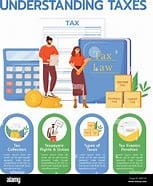Understanding Taxes: A Beginner's Guide


Oke, sini aku buat pembukaan artikel tentang pajak yang ramah SEO dan mudah dimengerti :
Understanding Taxes: A Beginner's Guide to Navigating the Tax World
Let’s face it: Taxes can be a real head-scratcher. From income tax to sales tax, property tax to payroll tax, the world of taxes can feel like a maze of confusing jargon & regulations. But fret not, because we’re here to shed some light on the basics & empower you to feel confident when navigating this often overwhelming topic.
This guide is tailor-made for beginners who might feel lost when it comes to understanding taxes. We’ll break down the core concepts in simple terms, leaving behind any confusing terminology & focusing on practical, real-world examples.
So why is it important to understand taxes? Well, taxes are the backbone of any modern society, funding vital services like healthcare, education, and infrastructure. Understanding your tax obligations isn’t just about complying with the law, it’s about being an informed citizen & contributing to the wellbeing of your community.
And even more than that, mastering the basics of taxes can empower you to make smart financial decisions. By understanding how your income is taxed & what deductions & credits you’re entitled to, you can potentially optimize your financial situation and save yourself some hard-earned money!
Whether you’re a student just starting out, a young professional, or someone wanting to gain a stronger grasp of the system, this beginner’s guide will provide you with the essential knowledge to navigate the tax world with greater confidence. So let’s get started!
Understanding Taxes: A Beginner's Guide
Navigating the world of taxes can feel overwhelming, especially if you’re new to it. But don’t worry, understanding the basics is easier than you think. This beginner’s guide will demystify taxes, breaking down key concepts and providing practical tips to help you navigate this essential aspect of adult life.
What are Taxes?
Taxes are mandatory contributions levied by governments on individuals and businesses to fund public services and programs. They are essential for financing everything from roads and schools to healthcare and defense.
Why do we pay taxes?
Paying taxes is a civic duty that allows us to contribute to the well-being of our communities. It’s the foundation of a functioning society, ensuring that everyone has access to essential public services.
What are taxes used for?
Taxes are the lifeblood of government funding. They pay for a wide range of public services and programs, including:
- Education: Funding for public schools, universities, and educational programs.
- Healthcare: Supporting healthcare systems, hospitals, and public health initiatives.
- Infrastructure: Building and maintaining roads, bridges, public transportation, and other essential infrastructure.
- Social Welfare: Providing safety nets like unemployment benefits, food assistance, and housing programs.
- Defense: Protecting national security and ensuring our safety.
Types of Taxes
Taxes come in various forms, each with its own purpose and application. Here are some common types of taxes:
Federal Taxes
- Income Tax: The largest source of federal revenue, income tax is levied on wages, salaries, investments, and other forms of income.
- Payroll Tax: This tax is deducted from your paycheck and used to fund Social Security and Medicare.
- Corporate Income Tax: A tax levied on the profits of corporations.
- Excise Tax: Taxes on specific goods and services, such as gasoline, alcohol, and tobacco.
State Taxes
- Income Tax: Many states also impose income taxes on residents.
- Sales Tax: A tax added to the price of goods and services at the point of sale.
- Property Tax: A tax levied on real estate, including homes, land, and commercial properties.
Local Taxes
- Property Tax: Similar to state property tax, but levied by municipalities.
- Sales Tax: Some local governments may impose additional sales taxes on top of state taxes.
Filing Your Taxes
Understanding how to file your taxes is crucial. Here’s a breakdown:
Who needs to file taxes?
Most adults are required to file taxes, but the specific requirements depend on your income, age, and filing status.
What is a tax return?
A tax return is a form you submit to the Internal Revenue Service (IRS) reporting your income, deductions, and credits. This information is used to calculate your tax liability.
What are tax deductions?
Tax deductions are expenses you can subtract from your taxable income, reducing the amount of taxes you owe. Examples include mortgage interest, charitable donations, and medical expenses.
What are tax credits?
Tax credits are direct reductions in your tax liability. They can be claimed for various things like child tax credits, education expenses, and energy efficiency improvements.
How to file your taxes?
You can file your taxes in several ways:
- Filing electronically: The fastest and most convenient way to file, often with free software options available.
- Hiring a tax professional: Tax preparers can help ensure accuracy and maximize your deductions and credits.
- Filing by mail: You can download tax forms from the IRS website and submit them via mail.
Tax Basics
Here are some essential tax concepts to understand:
Tax Brackets
Tax brackets are income ranges that determine the tax rate you pay. As your income rises, you move into higher tax brackets, paying a progressively higher rate on a portion of your income.
Standard Deduction and Itemized Deductions
The standard deduction is a set amount you can subtract from your taxable income. Itemized deductions allow you to deduct specific expenses, often leading to a larger deduction than the standard deduction.
Filing Status
Your filing status determines the tax rates and deductions available to you. Common filing statuses include single, married filing jointly, married filing separately, and head of household.
Tax Credits
Tax credits are direct reductions in your tax liability. They can significantly reduce your tax burden.
Tax Penalties
If you fail to file your taxes on time or make an error, you may face penalties.
Common Tax Terms
- Adjusted Gross Income (AGI): Your gross income minus certain deductions, used to calculate your taxable income.
- Taxable Income: The portion of your income subject to taxation.
- Tax Liability: The total amount of taxes you owe.
- Withholding: Taxes withheld from your paycheck throughout the year.
Tips for Saving on Taxes
- Plan for taxes throughout the year: Budgeting for taxes throughout the year can help you avoid a large tax bill at the end of the year.
- Take advantage of deductions and credits: Research deductions and credits you may be eligible for to reduce your tax liability.
- Invest in tax-advantaged accounts: Consider investing in retirement accounts like 401(k)s and IRAs, which offer tax advantages.
- Contribute to retirement accounts: Regular contributions to retirement accounts can reduce your taxable income and save on taxes in the long run.
Conclusion
Understanding taxes is essential for navigating the financial landscape. This beginner’s guide has provided an overview of key concepts and practical tips to help you get started.
Key Takeaways
- Taxes are mandatory contributions that fund public services and programs.
- Different types of taxes exist, including income tax, payroll tax, sales tax, and property tax.
- Filing your taxes correctly is crucial to avoid penalties and ensure you receive the correct deductions and credits.
- Planning for taxes throughout the year, taking advantage of deductions and credits, and investing in tax-advantaged accounts can help you save on taxes.
Where to find more information
- Internal Revenue Service (IRS) website: www.irs.gov
- Tax Foundation: www.taxfoundation.org
Get started with understanding taxes today!
Taking the time to learn about taxes can save you time, money, and stress in the long run.


